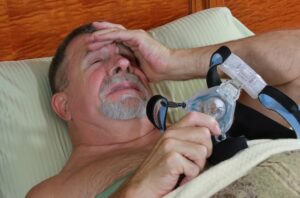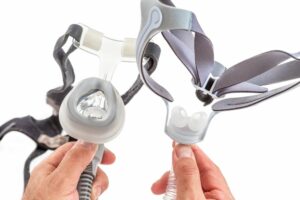
Due to potential chemical exposure, Royal Philips recalled several million CPAP (Continuous Positive Airway Pressure) machines and mechanical ventilator devices.
This medical device recall is due to potential exposure to particles and chemicals from the polyester-based polyurethane (PE-PUR) sound abatement foam used in these devices, which can cause significant and life-threatening injuries. The PE-PUR foam can degrade, causing particles to be inhaled or ingested, along with toxic chemicals created by the degradation of the foam.
Philips CPAP and Ventilator Recalls
Philips is the dominant supplier of CPAP, PAP, and mechanical ventilator machines in the United States. CPAP and PAP devices are primarily used by individuals who suffer from sleep apnea. These devices are also frequently used by individuals with COPD or chronic obstructive pulmonary disease. These devices prevent the repeated, temporary cessation of breathing associated with sleep apnea and COPD. These devices do this by providing continuous positive pressure to the airways preventing them from closing during sleep.
On April 26, 2021, Philips issued a voluntary recall of certain CPAP, Bi-Level PAP, and ventilator devices due to the risks posed by the degradation of the sound abatement foam used in these devices.
The recalled machines include the following devices manufactured before April 26, 2021:
Continuous Ventilator, Non-Life Supporting
• DreamStation ASV®
• DreamStation ST, AVAPS®
• SystemOne ASV4®
• C Series ASV, S/T, AVAPS®
• OmniLab Advanced Plus®
Non-continuous Ventilator
• SystemOne® (Q-Series)
• DreamStation CPAP®
• DreamStation Go CPAP®
• REMStar Auto CPAP®
• Dorma 400 CPAP®
• Dorma 500 CPAP®
Mechanical Ventilators
• Trilogy 100 Ventilator®
• Trilogy 200 Ventilator®
• Garbin Plus Ventilator®
• Aeris Ventilator®
• Lifevent Ventilator®
Continuous Ventilator, Minimal Ventilatory Support (Facility Use)
• A-Series BiPAP V30 Auto Ventilator®

More information can be found here, including photographs of the recalled devices. If you are uncertain if you have one of the recalled devices, you can reference your device’s serial number to determine if it is one of the recalled products.
Philips estimates 3 to 4 million of these recalled medical devices are in use in the United States. A large majority, almost 80%, of the recalled devices were CPAP machines used to treat sleep apnea.
Many individuals receive their CPAP or PAP devices from a home health or medical goods company through their health insurance. If you used a CPAP, PAP, or ventilator device from a home health or medical goods company but do not know the manufacturer or model number of the device, you should contact the supplier of the machine and ask them for the name and manufacturer of your device.
CPAP Recall and Cancer Danger
Philips used a polyester-based polyurethane foam (PE-PUR) to lessen the sound created by the internal workings of these devices. It is now known this foam can degrade, causing the users of these devices to inhale or ingest small particles of the PE-PUR into the lungs and bloodstream.
Degradation of the foam can also give off toxic gases such as Dimethyl Diazine, aka Dimethyldiazene, and Phenol, 2, 6-bis.
According to Philips, the degradation of the foam
can result in serious injury which can be life-threatening, cause permanent impairment or require medical intervention to preclude permanent impairment.
The recall notice from Philips states
The potential risks of particulate exposure include: irritation (skin, eye, and respiratory tract), inflammatory response, headache, asthma, adverse effects to other organs (e.g., kidneys and liver) and toxic, carcinogenic effects.
Chemical exposure due to off-gassing may cause
headache/dizziness, irritation (eyes, nose, respiratory tract, skin), hypersensitivity, nausea/vomiting, toxic and carcinogenic effects.
The chemicals may also cause other injuries. Phenols are a known highly caustic substance that can cause chemical burns of the skin’s epithelial cells. As epithelial cells are also present in the lungs, inhalation of phenol off-gas may cause significant damage to the lungs. Dimethyldiazene can cause a variety of kidney and liver-related injuries, including cancer.
The FDA has found that using unapproved methods of cleaning these devices, such as ozone gas or ultraviolet light, may increase the breakdown of the PE-PUR foam.
The FDA also found that devices used in hot and humid environments are more susceptible to degradation.
Philips CPAP Recall – Talk to Your Doctor
Philips recommends that anyone with a recalled CPAP or PAP medical device discontinue using the recalled device and consult with their physician.
Philips also cautions anyone using one of their life-sustaining mechanical ventilators to talk to their physician before taking action.
Always talk to your doctor first before discontinuing the use of any medical device or medication.
If you or a family member have suffered any injury from the long-term use of a recalled CPAP, PAP, or mechanical ventilator device, you should speak to an attorney experienced in medical device lawsuits. Possible injuries linked to the degradation of the PE-PUR foam include:
• Cancer of the kidneys, liver, or lungs
• Non-cancerous tumors of the kidneys, liver, or lungs that were surgically removed
• Fibrosis of the lungs or other lung damage
• Respiratory problems or episodes of respiratory distress
• Unexplained irritation of your lungs, throat, or trachea
• Any other toxic or carcinogenic injury
Claims involving defective medical devices are complex and require attorneys with experience in FDA regulations, federal preemption issues, device manufacturing processes, and medical procedures and terminology. Doyle APC attorneys have significant experience in medical device cases.